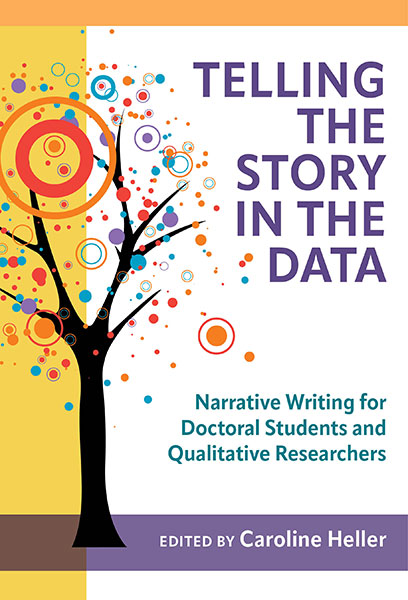Professors: Request an Exam Copy
Print copies available for US orders only. For orders outside the US, see our international distributors.
Edited by: Caroline Heller
Foreword by: David T. Hansen
Publication Date: November 25, 2022
Pages: 208

Traditional dissertations aiming to illuminate the landscapes of education are often too poorly written to have far-reaching readership. This book examines the inner workings of a doctoral course focused on teaching qualitative researchers strong narrative writing. By the time doctoral students finish their dissertation research, bolstered by theoretical grounding and time in the field, they are in a unique position to offer insights about education that should be heard in the public arena, not just during dissertation defenses. For this to happen, doctoral students need to know how to achieve their writerly goals. This book focuses on helping doctoral students and all qualitative researchers do just that. It is also an excellent resource for professors teaching narrative writing. Readers will learn how to use narrative writing to “tell the story in the data” so their research will be read and potentially infuse policy decisions with the complexity such considerations deserve.
Book Features:
Caroline Heller is a professor and director of the individually designed PhD specialization at the Graduate School of Education, Lesley University.
“I believe every qualitative researcher, whether novice or veteran, who follows this account to its end will be powerfully motivated to reimagine their own approaches to writing.”
—David T. Hansen, John L. and Sue Ann Weinberg Professor in Historical and Philosophical Foundations of Education, Teachers College, Columbia University
“In her brilliant new book, Caroline Heller has created an entirely new genre for teaching and learning narrative writing in graduate school. She generously shares her complete syllabus and inventive pedagogy, both flexibly designed to foster her students’ explorations of diverse ways to explore through narratives their own topics and interests rather than ritually enact traditional academic arguments. In her responsive and always emerging design of the course syllabus, and through insights gained by and from her students, they (in their ten beautifully written chapters) adopt and adapt a powerful discourse that offers the readers a compelling story of how and what they are learning over time as they narrate their emerging understandings of their own research topics and interests, and how these relate to their individual life narratives. Together the authors provide rich, accessible images of how such a course in narrative inquiry/writing can inform what matters to students and what will motivate and sustain them in researching and learning over a lifetime.”
—Susan L. Lytle, professor emerita, University of Pennsylvania
“Telling the Story in the Data answers Caroline Heller’s excellent central question: how can we help qualitative research students ‘find pathways to their own representational success?’ This book charts a clear-headed, intellectually rich, and powerfully intimate pedagogical path toward that goal. All qualitative researchers will benefit from reading and following Caroline’s and her students’ journeys.”
—Wendy Luttrell, professor, CUNY Graduate Center
Contents
Foreword David T. Hansen vii
Acknowledgments xi
Introduction: The Seminar That Inspired This Book Caroline Heller 1
Seminar Syllabus: Narrative Writing for Qualitative Researchers, Spring, 2019 7
1. Invitations and Permissions: Consider the Meatball 19
Krysta Betit
2. Before, Between, and Beyond: Communicating Meaning 24
Garo Saraydarian (followed by drafts of paper by Garo)
3. Finding the Story in the Data 39
Denise Mytko (followed by drafts of papers by Denise and Thelma Goldberg)
4. The River Is Wide 51
Rebecca Redlon (followed by drafts of paper by Rebecca)
5. Meaning Through Journeying 65
Krysta Betit (followed by art work and drafts of chapter by Krysta)
6. Representational Adequacy: Bringing My Scene to Life 78
Jeanne Lima
7. Finding Narrative Gifts in Film 89
Allison Horváth-Tucker
8. Number Our Days: A Study of Community 95
Thelma Goldberg (followed by drafts of paper by Garo Saraydarian)
9. Sweetgrass: A Chance to Feel 112
Avigail Shimshoni
10. Envisioning and Embracing 124
Kat Marsh (followed by drafts of paper by Kat)
11. Wrong Question and Finding and Writing the Angle of an Interview 145
Kat Marsh (followed by drafts of paper by Kat)
12. Circle of Trust: Vulnerabilities Carefully Rendered 160
Rebecca Redlon and Garo Saraydarian
Appendixes of Seminar Handouts
Appendix A: Revision Worksheet 171
Appendix B: Taming the Chaos of Your Data 173
Appendix C: Thoughts on Characterization 177
Appendix D: Sentiment and Sentimentality 179
Appendix E: Objective Correlative: T. S. Eliot 181
Index 183
About the Contributors 187
Professors: Request an Exam Copy
Print copies available for US orders only. For orders outside the US, see our international distributors.